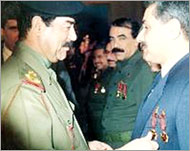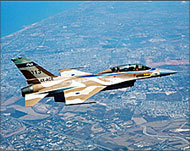The death of a nuclear dream
On this day in 1981, as the Iran-Iraq war was raging along Iraq’s eastern borders, Israeli warplanes bombed the Iraqi nuclear plant in Twaitha near Baghdad.

A squadron of Israeli F-15s and F-16s fired 16 missiles at the Tammuz nuclear reactor, each of them containing 1,000kg of explosives, and destroyed the core.
The Israeli planes returned home unscathed.
Until June 1981, Tammuz had been used only as a civilian facility, but that changed after it was bombed.
Nuclear dream
The bombing was not the first attack on Saddam Hussein’s nuclear programme, but it did harden his resolve to acquire an Arab weapon.
 |
|
Yahia al-Mashad was murdered |
During the Iran-Iraq war, Iranian aircraft began a series of attacks on the facility, but failed because of Iraqi air superiority.
In April 1979, nuclear equipment had been destroyed in a French port hours before it was shipped to Iraq. No one claimed responsibility.
Police described the operation as sophisticated.
In the early 1980s, several Iraqi nuclear scientists were killed under mysterious circumstances while outside the country, prompting Saddam to issue a ban preventing them from leaving Iraq.
On June 13, 1980, Yahia al-Mashad, an Egyptian nuclear scientist who worked for the Iraqi project, was found dead in his hotel room in Paris while on an official visit. His skull was fractured and his room was vandalised.
The last person to see him before his death, a female confidante and potential witness in the case, was killed by a speeding car within two weeks. The car was never found.
The al-Mashad case was closed for lack of evidence.
Abd al-Rahman Rasoul, an Iraqi Kurdish civil engineer in charge of constructing the premises of the Iraqi nuclear plant, was shot dead in Paris on December 13, 1980. The coroner’s report also said that an unknown virus was found in his blood.
On June 9, 1981, Salman Rashid al-Lami, an Iraqi nuclear scientist, was found dead in Geneva. His body was grotesquely swollen. A Swiss coroner recorded that death had been caused by an unknown virus.
Green light
 |
|
Saddam assigned Jafar (R) to the |
In his book The Last Confession, Jafar Dia Jafar, the head of the Iraqi nuclear programme, wrote that he was summoned to Saddam’s office in September 1981, three months after the Israeli raid.
Jafar says Saddam told him: “How is it that it is OK for Israel to own nuclear weapons and at the same time the Arabs are prohibited from operating nuclear reactors for purely scientific and peaceful purposes?
“We have to replace the bombed reactor with a new one, built 100 per cent by Iraqi brains and hands. We have to own the nuclear weapon to be a deterrent weapon against Israel and those who protect Israel.”
Jafar says Saddam told his head of intelligence, Barazan al-Takriti: “Give this man everything he needs for the sake of Iraq and the future of Iraq.”
Imad Khadduri, a senior Iraqi nuclear scientist, said the Tammuz bombing was a painful blow. “We worked hard in that project, it was our dream,” he said.
The facility’s focus turned from civilian power to developing nuclear weapons.
“All of our resources were to focus on enriching uranium,” Khadduri said.
“We put up the facade that we were very interested in building a nuclear reactor for electric power generation to be purchased from the Soviet Union, and we pursued that mission in co-operation with the IAEA, in parallel with our covert uranium enrichment effort.”
‘Close to the bomb’
France had built the Tammuz reactor, but Jafar said it was reluctant to get involved after the bombing.
“France built Iraq‘s peaceful nuclear reactor in the 1970s when the De Gaulist Giscard d’Estaing was in office,” he said.
“His successor, Francois Mitterrand, who assumed power in May 1981, was less enthusiastic and never approved the reconstructing of Iraq‘s nuclear capabilities.
“However, we moved on with 100 per cent Iraqi resources.
“In 1990 we were relatively close to the nuclear bomb, three to four years were needed to produce the bomb, but the whole programme came to a halt when Iraq invaded Kuwait and subsequent UN sanctions were imposed on Iraq.”
 |
|
A squadron of Israeli warplanes |
Iraq‘s nuclear plant was bombed and destroyed for the second time on day one of the first Gulf war in 1991.
George Bush Snr announced the news on TV, saying the Iraqi nuclear programme was no longer a threat to international peace.
Colonel Muhmmad Jasim al-Dulaimi, an Iraqi air defence officer at the time of the Israeli raid, said: “On that day, I was in charge of the air defence unit in eastern Baghdad.
“The Israeli raid took place at the peak of what was known as the war of the cities between Iraq and Iran. Iranian warplanes were bombing Baghdad and other cities and Iraqi war planes and missiles were bombing Tehran.”
Baghdad is only 120km from the Iraq-Iran border, but Tehran is 800km away.
“It was much easier for Iranians to attack our capital than us attacking theirs, all our capabilities were pointing east, the western front was not in Iraq‘s calculations. However, we should not deny Israel‘s technical superiority,” al-Dulaimi said.
‘Act of savageness’
Liqa Makki, a journalism professor in Baghdad under Saddam, said: “Bombing the Iraqi nuclear reactor was an act of savageness and of Israel taking the law into its own hands.
“The programme was peaceful and legally monitored by the International Atomic Energy Agency (IAEA), and yet no diplomatic efforts preceded the strike. They simply bombed, just like that.”
Iraq filed an official complaint to the IAEA after the reactor bombing, saying that under international law an attack on a nuclear premises is a nuclear attack.
The Israeli attack was officially condemned by the UN.